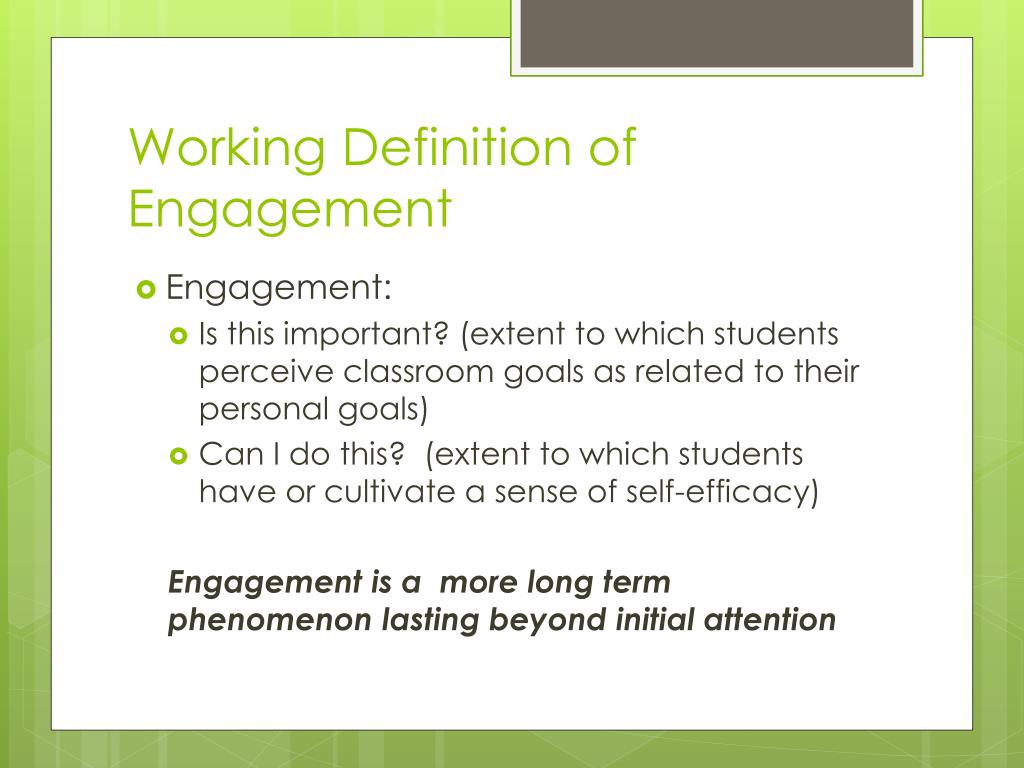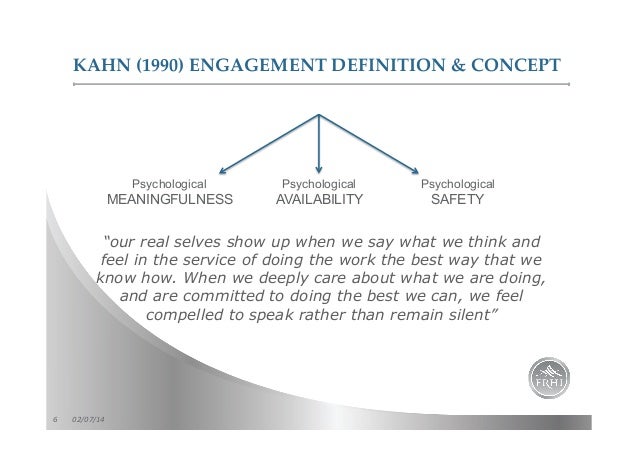

519) occurs along a continuum with different students contributing different levels of investment in the same objects and has both quantitative and qualitative aspects.


In Astin’s view, involvement “refers to the investment of physical and psychological energy in various objects” (p. Alexander Astin’s research on student involvement in the 1980’s, the most-cited (on Google Scholar) of which is this paper from 1984, is considered by many scholars to be the forerunner of the modern notion of “engagement”. The concept of involvement speaks to a more modern origin of the concept of academic engagement. In an academic setting, “engagement” can therefore be understood as a state of committed involvement in an activity into which we have entered willingly and with the intention to complete, and in which “we are entirely present and not somewhere else” (p. (The term “mortgage” derives from the same root and has a similar connotation.) The modern usage of the word is similar: To be “engaged” means to pledge oneself to a binding involvement with something or someone, much like the usage of this term in the context of a pledge to be married. We will only give some background on the origins of the term, and then state a framework for “engagement” used to parse the various results in this review’s studies that pertain to engagement.Īs Axelson and Flick point out in their article Defining Student Engagement, the term “engage” originally derives from a Norman word meaning “pledge”, so that to “engage” meant to enter into a binding obligation to another through oaths or laws. We will not attempt to rectify the various concepts of “engagement” that permeate discussions of teaching and learning here. There is no rigorous definition of “engagement” from which to conduct a scientific analysis of research on the subject, and given the wide array of meanings of this term in actual use, such a definition is unlikely to come to light in the near future. Even when confined just to student-centered contexts, “engagement” can sometimes refer to the lived experiences of students in terms of feelings and emotions at others, the behaviors of students that indicate a deeper level of involvement at others, a set of beliefs or perceptions that students hold about their learning while at others, it is a combination of these, often undifferentiated between the aforementioned aspects of “engagement”. At times, it is defined in terms that describe certain student activities and behaviors, while at others it describes what parents, teachers, and school leaders do to elicit those activities and behaviors. Unfortunately, despite the wide usage of “engagement” in academic discourse, the term remains poorly operationalized. However, we must first come to terms with the meaning of the word “engagement” as it relates to learning. The results of the studies in this review that specifically target “engagement” are therefore numerous, widely varied, and of potential use to many school leaders and educators. A large number of the studies in this review targeted student engagement, and there has been a strong and sustained interest in “engaged learning” at all levels of discussion on teaching and learning, to say nothing of companies that manufacture furniture for ALCs. One of the main questions in this literature review is: What effects do active learning classrooms (ALCs) have on student engagement? This dimension of the student learning experience is connected to, but quite distinct from the effects of ALCs on student learning outcomes such as exam and course grades or learning gains on concept inventories. So here it is in first-draft form, formatted a little differently than it will be in the paper to make it more like a blog post. So I drafted the following as part of the paper, and after the fact I thought it might make a good blog post. But it's too popular of a concept to just leave out. Although we see the need to discuss these results, I've been resistant to including that discussion in the paper because the term, "engagement", is so poorly-defined that it seems meaningless.

A number of the studies my co-author and I included in the review approach the topic of "engagement" in some way or another. I am in the final drafting stages of a literature review on active learning spaces, one of the major projects I was committed to doing on sabbatical.


 0 kommentar(er)
0 kommentar(er)
